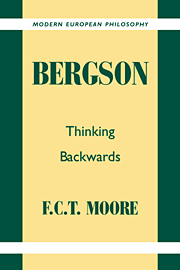Book contents
- Frontmatter
- Contents
- Abbreviations
- Preface
- Introduction
- 1 The Requirement of Precision
- 2 Philosophy and Knowledge: Uses and Misuses of ‘Representation’
- 3 Durance: Unfolding in Time
- 4 Laughter
- 5 Tension
- 6 Aporetic Philosophy
- 7 Branching
- 8 Going Beyond
- 9 Magic and the Primitive: The Antinomies of Pure Intelligence
- 10 Paradoxical Epilogue: Reason Ruefully Repressed
- Works Cited
- Index of Names
- Index of Subjects
9 - Magic and the Primitive: The Antinomies of Pure Intelligence
Published online by Cambridge University Press: 05 June 2012
- Frontmatter
- Contents
- Abbreviations
- Preface
- Introduction
- 1 The Requirement of Precision
- 2 Philosophy and Knowledge: Uses and Misuses of ‘Representation’
- 3 Durance: Unfolding in Time
- 4 Laughter
- 5 Tension
- 6 Aporetic Philosophy
- 7 Branching
- 8 Going Beyond
- 9 Magic and the Primitive: The Antinomies of Pure Intelligence
- 10 Paradoxical Epilogue: Reason Ruefully Repressed
- Works Cited
- Index of Names
- Index of Subjects
Summary
We have seen, in a necessarily somewhat piecemeal fashion, Bergson's reassessment of the roles of reason and language in human life:
[L]ife is a certain effort to obtain certain things from brute matter, and … instinct and intelligence, taken in their developed state, are two ways of employing an instrument for this purpose: in the first case, the instrument is part of the living creature; in the second, it is an inorganic tool, which it was necessary to invent, to fabricate and to learn to handle.
Bergson is well aware how this view sets him apart from a long tradition in which human reason has a nobler role:
Human intelligence, as we conceive of it, is in no way the kind of intelligence depicted by Plato in the allegory of the cave. It does not have the function of watching vain shadows pass by any more than of turning round and contemplating the blazing sun. It has other things to do. Yoked, like plough-oxen, to a heavy task, we feel the play of our muscles and joints, the weight of the plough and the resistance of the soil: the function of human intelligence is to act and to know that it is acting, to enter into contact with reality and even to live it, but only in so far as it is concerned with the job being done, and the furrow being ploughed.
- Type
- Chapter
- Information
- BergsonThinking Backwards, pp. 123 - 139Publisher: Cambridge University PressPrint publication year: 1996

